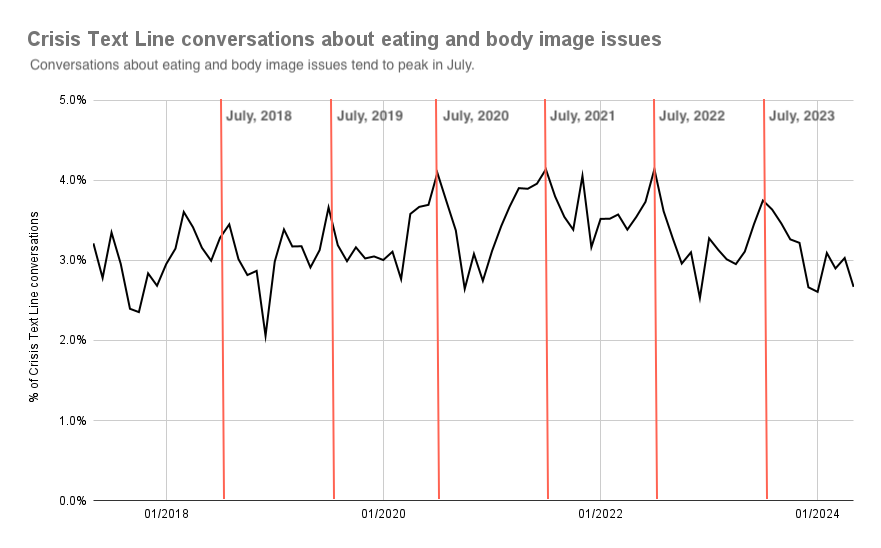Three Insights in Crisis Text Line Data During the Summer
Summer is approaching, and temperatures are rising across the United States. As students finish the school year, family routines will start to shift over the next several months. Based on the last few years, here are three trends we noticed in Crisis Text Line conversations in the summer.
1. Crisis Text Line conversations about body image and eating increase during the summer.
We typically see a 30% increase in the percentage of body image and eating related conversations between June and August, when they go from 3% of our volume to around 4%. These conversations tend to peak in July, as the chart below illustrates.

2. High temperatures and weather events affect our texters’ mental health.
For most of the U.S, the hottest day falls between mid-July and mid-August. This is also a time for volatile weather events: hurricane season is between June 1 and November 30. Both of these trends profoundly affect mental health, based on research by our partners at Appalachian State University and North Carolina State University. They found that:
-
- When it’s unusually hot, young people in urban areas reach out to more to Crisis Text Line; and
- Hurricanes have lasting mental health consequences. Our volume increased significantly both after Hurricane Ida and Hurricane Laura in areas that were affected by the hurricanes.
3. Conversations about bullying drop when schools are closed.
Finally, some good news. In the summer, we receive significantly fewer conversations about bullying. Conversations about bullying have been surging overall for several years in our data, as we have noted in our 2023 United in Empathy report. However, each year, we see these conversations drop when schools are closed. In 2023 overall, over 5% of conversations included mentions of bullying among young texters, but these conversations dropped by approximately 20% in the summer (June-August).
Methodology note and limitations:
Our texters are not representative of the U.S. population. All conversations in this analysis were anonymized and de-identified. Issues like bullying and eating and body image issues are tagged by Crisis Counselors in a survey after the conversation ends. Age and gender are collected in an optional post-conversation survey. We included English conversations only, and only conversations that took place in the United States; that were not pranks or tests, and where the texter did not drop off before engaging with the Crisis Counselor.
To learn more about our research and methodology, please email research@crisistextline.org
For media requests, please reach out to Vanessa Showalter, Crisis Text Line’s Senior Communications Director, at press@crisistextline.org
